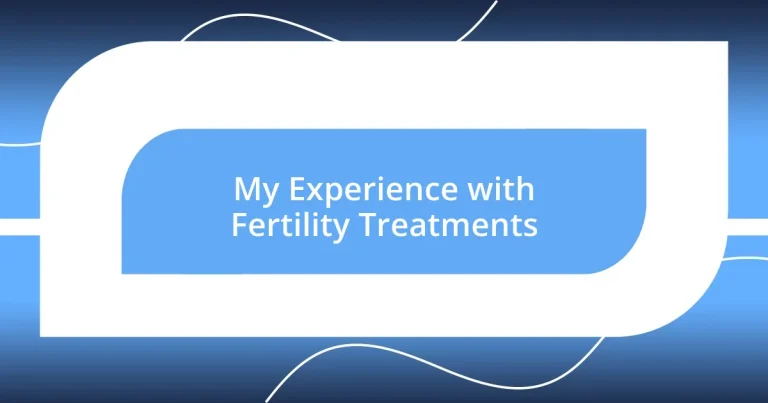Key takeaways:
- Fertility treatments vary widely, with options such as IVF, ICSI, and surrogacy tailored to individual needs, requiring personalized guidance from specialists.
- The emotional journey of fertility treatments is intense, necessitating support networks and coping strategies like mindfulness and creative outlets to manage stress and uncertainty.
- Understanding success rates and maintaining realistic expectations are crucial; focusing on small victories and progress can foster resilience during the treatment journey.
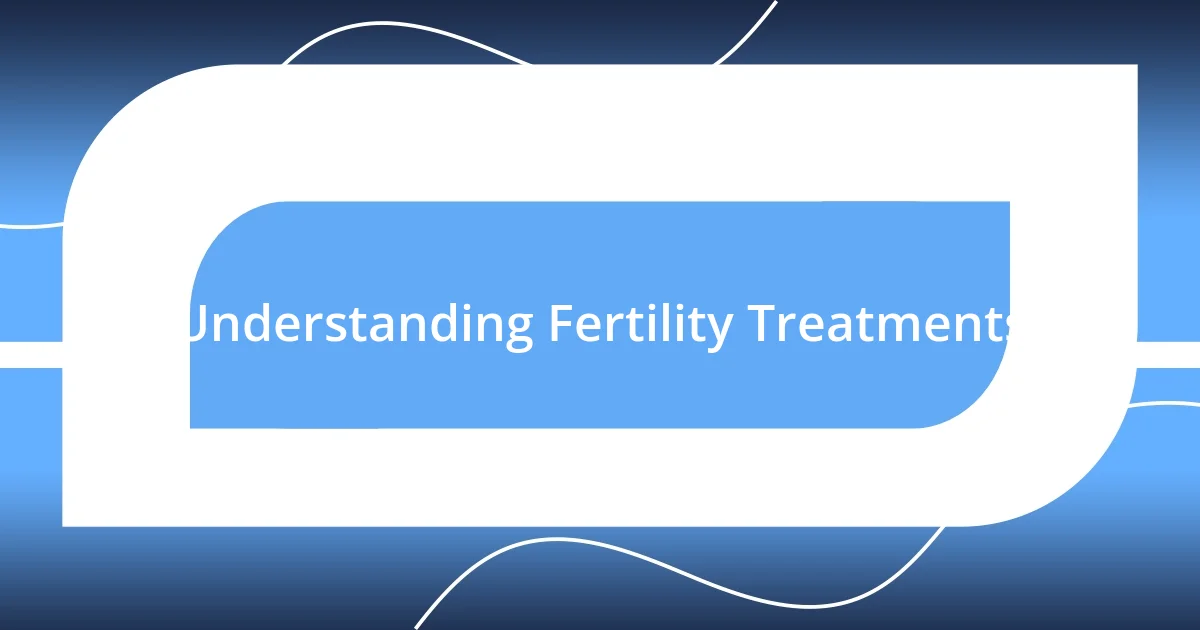
Understanding Fertility Treatments
Fertility treatments can seem overwhelming at first, but understanding them is the key to navigating your journey. I remember feeling a mix of anxiety and hope when I first learned about options like IVF, or in vitro fertilization. It raised questions for me: What does the process actually entail, and how long does it take? These are valid concerns that many share as they dive into this complex world.
One thing I discovered is that there’s no one-size-fits-all solution. Each treatment, whether it’s medication to stimulate ovulation or more advanced procedures like ICSI (intracytoplasmic sperm injection), has its own set of benefits and challenges. It made me stop and reflect: What could the right choice look like for me? Personalizing the approach with the help of a knowledgeable fertility specialist can make a huge difference.
Throughout this experience, the emotional rollercoaster can be intense, often accompanied by feelings of longing and uncertainty. I found it helpful to connect with others in similar situations; sharing stories helped me process what I was going through. Have you ever considered how support networks impact your emotional well-being during frustrating times? Knowing others are on the same path can bring a sense of camaraderie and strength.
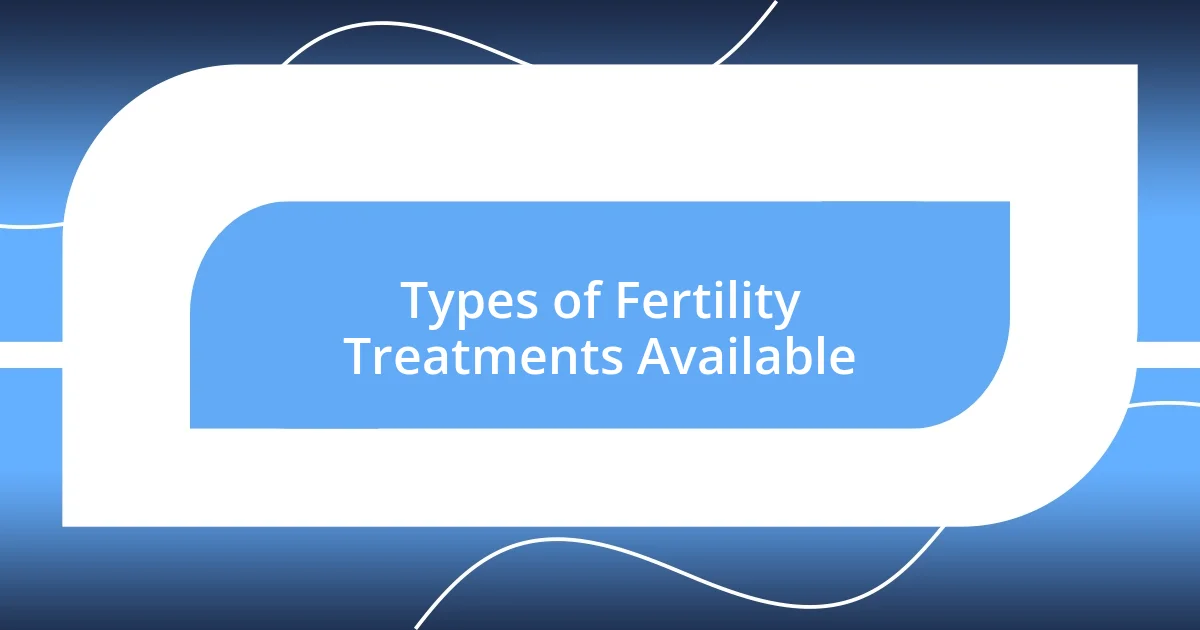
Types of Fertility Treatments Available
Fertility treatments come in various forms, each catering to unique needs and circumstances. I remember the moment my doctor laid out the options in front of me; it felt like a menu filled with possibilities, yet it also led to tough decisions. From basic medications to intricate procedures, each route had its emotional weight and implications.
Here’s a brief list of the common types of fertility treatments available:
- Ovulation Induction: Using medications to stimulate ovulation, often a first step in fertility treatment.
- Intrauterine Insemination (IUI): Introducing sperm directly into the uterus during ovulation to increase the chances of fertilization.
- In Vitro Fertilization (IVF): A more complex procedure where eggs are fertilized outside the body and implanted in the uterus.
- Intracytoplasmic Sperm Injection (ICSI): A specialized form of IVF where a single sperm is injected directly into an egg, often used in cases of male infertility.
- Egg and Sperm Donation: Utilizing donor eggs or sperm when necessary, providing an alternative for couples facing infertility.
- Surrogacy: Involving another woman to carry the pregnancy for couples unable to do so themselves, an option I explored deeply as I considered my choices.
Each treatment option is laden with its own set of emotional ups and downs. For instance, while IVF offered hope, the idea of multiple appointments and injections initially struck me with anxiety. Engaging in these treatments is undeniably personal, and I learned that my journey would require strength, patience, and an open heart.
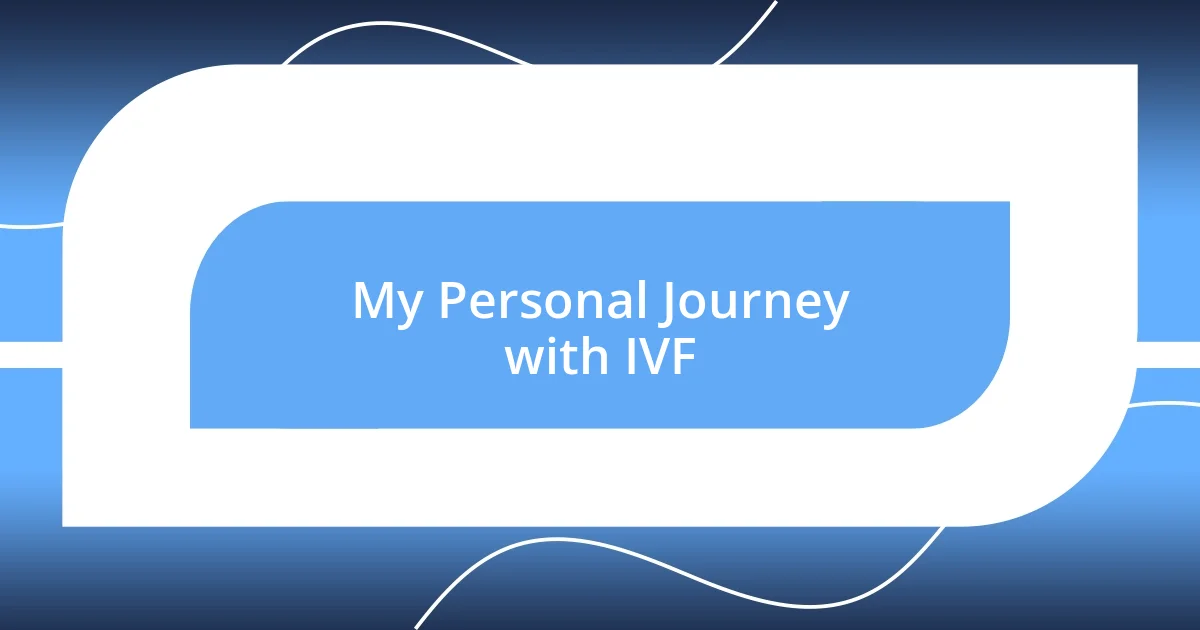
My Personal Journey with IVF
I remember when I first began my journey with IVF; it felt like stepping into uncharted territory. The initial appointments were filled with a blend of nervous anticipation and excitement. My fertility specialist explained the entire process, breaking it down into manageable steps, but I still couldn’t shake the overwhelming feeling of uncertainty. What struck me was the constant balancing act between hope and fear. Each cycle brought with it a renewed sense of optimism, yet the stakes felt incredibly high.
As I moved forward, the emotional intensity fluctuated just as the hormones did. I vividly recall the day of my egg retrieval; it felt surreal yet empowering. I was in control, making a decision that could potentially lead to parenthood. But it was also a day tinged with anxiety—what if it didn’t work? Throughout that time, I made sure to document my thoughts and feelings in a journal. Reflecting on those moments helped me process the whirlwind of emotions I faced, while also providing clarity when doubt crept in.
Ultimately, IVF taught me so much about resilience. Each setback, whether it was a failed cycle or an unexpected complication, pushed me to reevaluate my priorities and embrace a sense of community. I connected with others navigating similar challenges, which was comforting on days of disappointment. Have you ever found solace in sharing your story with someone? It remains a reminder that we are never truly alone in our struggles.
| Aspect | My Experience with IVF |
|---|---|
| Initial Feelings | Nervousness and hope filled each appointment. |
| Key Events | Egg retrieval was empowering but also nerve-wracking. |
| Support | Connecting with others provided comfort and strength. |
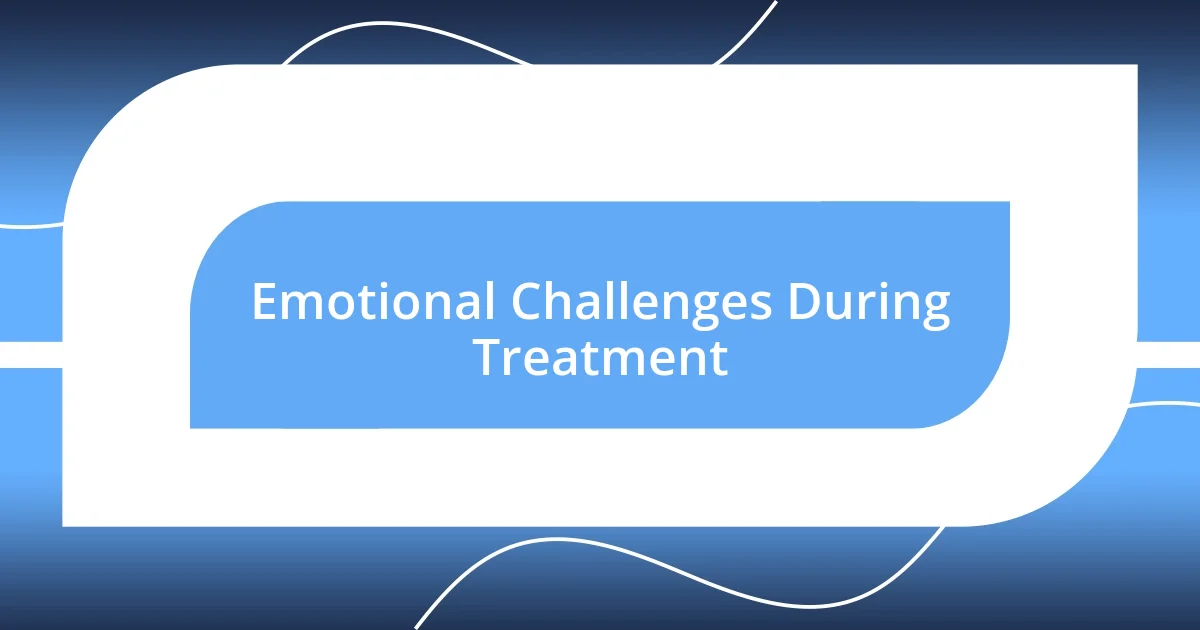
Emotional Challenges During Treatment
Navigating the emotional landscape during fertility treatments can feel like riding a rollercoaster, with endless ups and downs. I remember pacing around my living room on days when I had to take a crucial test; the anticipation was palpable. It made me question everything—what if I was putting my hopes in the wrong place? I began to realize that grappling with these feelings was part of the journey itself.
There were moments when the sadness would hit unexpectedly, often during what seemed like ordinary discussions with friends. I’d hear about their family plans, and while I genuinely wanted the best for them, it would send me into a spiral of self-doubt and longing. Have you ever felt that twinge of jealousy when someone else’s happiness reminds you of your own unfulfilled dreams? I found myself teetering between happiness for others and sadness for my situation, and that was such a tough balancing act.
As the treatments progressed, I sought new ways to cope. For me, art became my refuge—I poured my feelings into painting. It was a cathartic release that transformed my anxiety into vibrant colors on a canvas. Engaging creatively helped me process my emotions in a way that felt productive. It made me wonder: have you found your own escape during challenging times? Finding an outlet can sometimes shed light on our deepest feelings and connect us to our truth in ways we never anticipated.
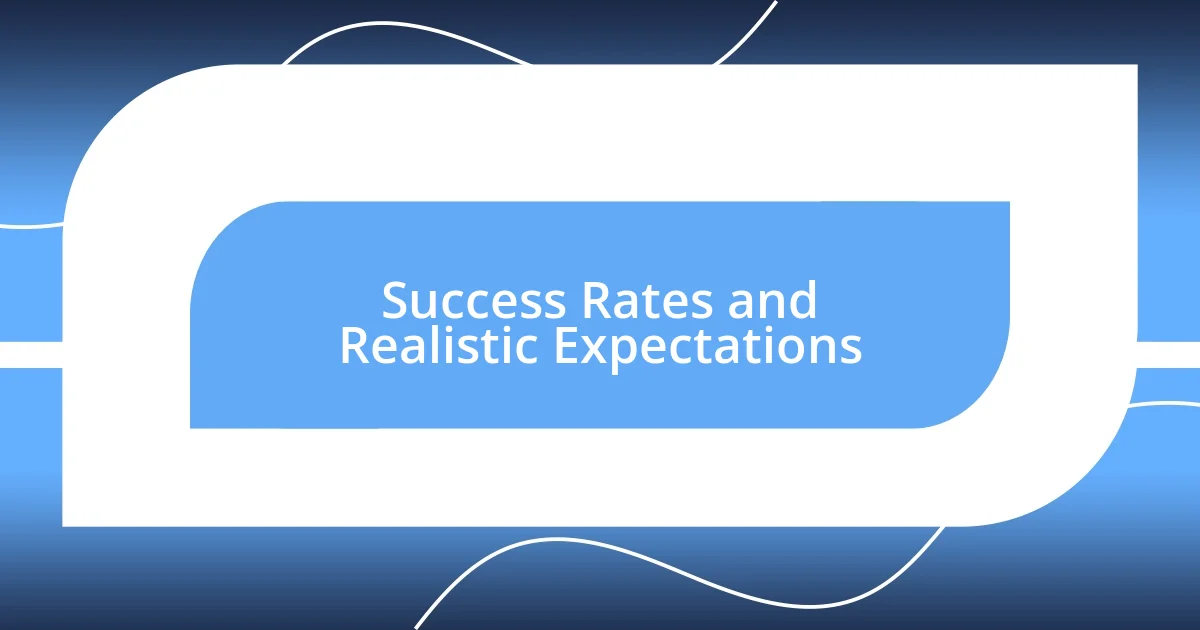
Success Rates and Realistic Expectations
Success rates in fertility treatments can be quite variable, and understanding this range is crucial for setting realistic expectations. When I first learned about IVF success rates, I was initially overwhelmed, and I’d often find myself stuck on a single number. It was only after a candid conversation with my doctor that I grasped how success isn’t just binary. It truly depends on factors like age, diagnosis, and overall health, which can significantly shift those numbers. Have you ever found yourself fixating on a statistic when there’s so much more to the story?
I remember the first time I read that the success rates for someone my age were around 40%. I felt a rush of excitement but also anxiety because, in my mind, that 60% failure rate loomed large. Eventually, I learned to look at these numbers as general guidelines rather than personal prophecies. It’s essential to discuss with your fertility specialist what those results mean for your unique situation. Understanding the context behind the statistics helped me approach each cycle with a mindset geared toward patience and resilience.
Having realistic expectations can really help mitigate disappointment. For instance, I acknowledged early on that not every cycle would lead to success but rather a step in my journey. In one cycle, when things didn’t go as planned, I felt disheartened but not defeated. I had learned to celebrate small victories, like the number of healthy embryos created. Focusing on progress rather than on just the end goal can foster a sense of hope. Have you thought about what small victories you could celebrate along the way? Embracing this mindset made a world of difference in how I experienced each treatment.
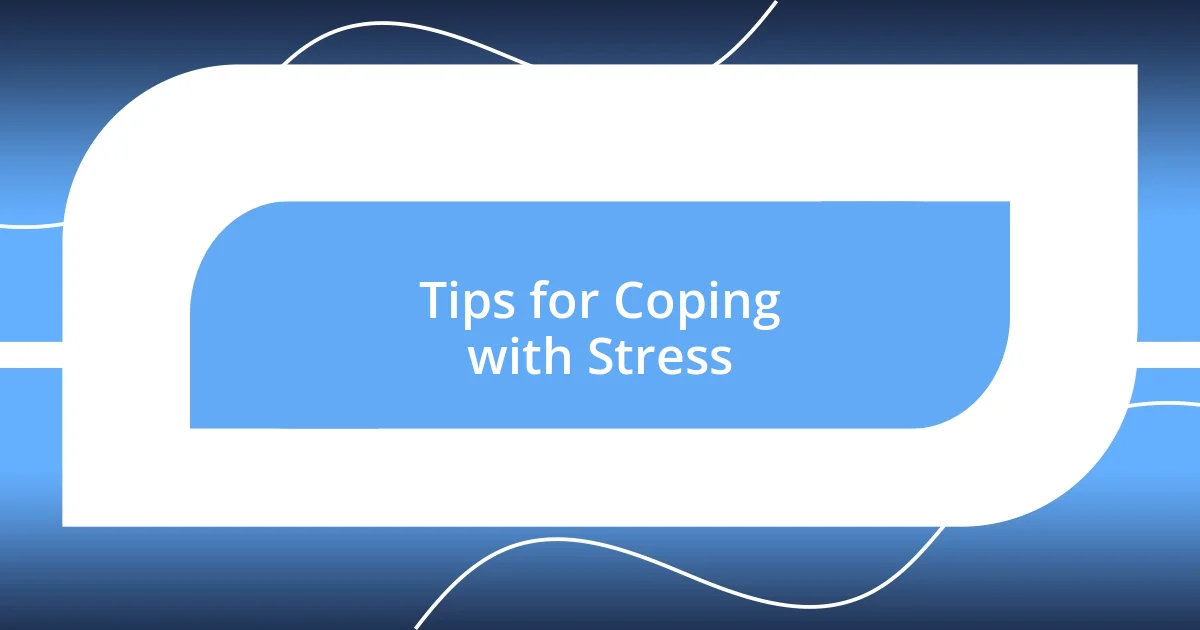
Tips for Coping with Stress
Finding effective ways to cope with stress during fertility treatments is essential for maintaining emotional balance. One strategy that worked wonders for me was establishing a daily mindfulness routine. I remember sitting on my balcony each morning, closing my eyes, and focusing on my breath. That simple practice grounded me and provided a moment of peace amidst the chaos. Have you tried incorporating mindfulness into your day? It can serve as a gentle reminder to slow down and reconnect with yourself.
Another tip is to lean on your support network. I realized early on that sharing my feelings with close friends and family relieved some of the burden. One evening, I had a heart-to-heart with my best friend, who candidly shared her struggles with infertility. It struck me how we often think we are alone in our challenges, but connecting with others can create powerful bonds. Who can you reach out to when the weight of uncertainty feels heavy? Sometimes, just knowing that someone else understands can make all the difference.
Lastly, don’t underestimate the power of physical activity. I found that taking long walks in nature allowed me to clear my head and release pent-up emotions. One foggy afternoon, I walked through a quiet park, surrounded by trees, and felt a wave of clarity wash over me. It reminded me how essential it is to nurture not only our minds but also our bodies during such an emotionally charged journey. Have you found an activity that helps you process stress? Engaging your body can be a therapeutic outlet and a way to invigorate your spirit on this path.
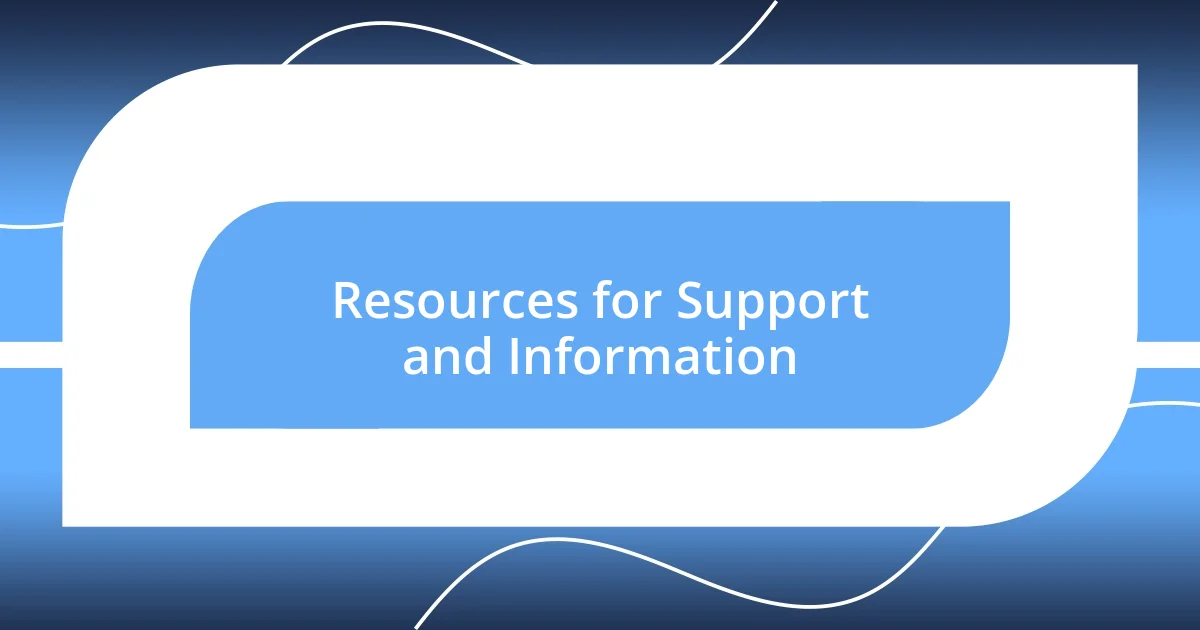
Resources for Support and Information
Finding the right resources for support and information can make a world of difference during fertility treatments. I distinctly remember stumbling upon an online forum where individuals shared their personal experiences. Reading those stories was like finding a lifeline; I realized that I wasn’t alone, and that in itself was comforting. Have you ever sought out a community where you felt understood? It can provide both wisdom and camaraderie.
Healthcare professionals are another invaluable resource. I can’t emphasize enough how important it was for me to find a fertility specialist who was open and approachable. In our discussions, he answered all my questions—no matter how trivial they seemed—and provided me with educational materials that clarified my treatment options. I often revisited those resources whenever I felt overwhelmed, which helped me make informed decisions. Who do you trust in your journey?
Additionally, consider exploring local support groups or workshops. I attended a seminar that featured different experts discussing various aspects of fertility. Hearing their insights and connecting with others in the same boat was incredibly validating. It created a sense of community where we could share laughter and tears. Have you explored any local resources in your area? Finding a supportive environment can be a game-changer for emotional resilience.












